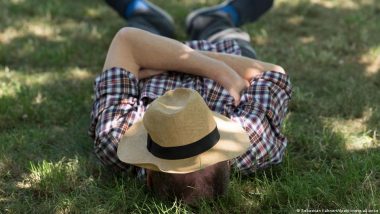Medical experts suggest workers take midday siestas, while the German health minster recommends cooling off at church as Germany suffers from extreme heat.Germany, like so many other European countries, is experiencing a blistering hot summer. Record-breaking temperatures are especially hard on children, the elderly and those with underlying health issues. The consequences of scorching heat are serious.
In 2022, when Europe endured the hottest summer since records began, over 600,000 heat-related deaths were recorded, according to recent calculations.
That year, Italy saw 18,010 heat-related deaths, more than any other European nation. This was followed by Spain with 11,324 fatalities and Germany in third place with 8,173, according to a report published in Nature Medicine by Barcelona Institute for Global Health researchers.
Without protective measures to shield ourselves from extreme heat, an average of 68,000 people will die from the heat from 2030 onward, the researchers warn.
World temperatures are likely to rise to record levels by 2027, according to the United Nations.
Time to copy southern Europe
It's no wonder that German health experts are scrambling to find ways to better cope with record temperatures. Many major cities, after all, still lag behind in devising adequate heat protection measures.
So far this year, the German Weather Service recorded the highest temperature a few days ago in Bavaria at 38.8 degrees Celsius (101.84 degrees Fahrenheit).
Germany's public health physicians recently made a surprising proposal. "We should take our cue from the work culture of southern countries when it comes to dealing with heat," Johannes Niessen, chairman of the Federal Association of Public Health Service Doctors, told Redaktionsnetzwerk Deutschland.
"Getting up early, working productively and then taking a siesta at lunch is an approach we should follow in the summer months," he said.
People are simply "not as productive in intense heat," he added, which is why he recommends tackling complex tasks in the early morning.
"Also, [workplaces] need plenty of fans and lighter clothing [is advisable], even if the office dress code doesn't really allow for it," he said.
Other recommendations from Niessen include drinking enough water, eating small, light meals spread over the day and maybe even taking a cold footbath if you are lucky enough to work from home.
German Health Minister Karl Lauterbach endorsed these recommendations, taking to Twitter to say that "taking a siesta in the heat is not a bad idea."
He added that employers and employees should first, however, come to an arrangement over such midday breaks. In any case, said Lauterbach, who is also a physician, medically siestas "certainly makes sense for many professions."
Labor unions demand heat protection
Whether these traditional lunch breaks, which are widespread in parts of southern Europe, will find favor with German employers, who would need to allow for greater working hour flexibility, remains to be seen.
Labor unions, meanwhile, want to make companies do more to protect their employees' health.
The German Federation of Trade Unions (DGB) has called on employers to conduct regular heat hazard assessments during the summer months to ensure occupational safety and health amid high temperatures.
"Employers must protect their employees from heat, as working in hot conditions is stressful and can endanger their health," DGB's Anja Piel told Redaktionsnetzwerk Deutschland.
She said failing to do was "completely unacceptable in light of climate change and extremely hot summers," while also calling for offices with temperatures above 35 degrees Celsius to be shut.
Churches to the rescue
Minister Lauterbach shared another idea on Twitter while on holiday in Italy's Tuscany region. During a visit to Basilica di San Francesco in Siena, the minister tweeted that churches could be opened to the public to provide shelter during heat waves. His recent heat protection plan, however, doesn't feature this idea.
Lauterbach's suggestion received a warm welcome from the German Bishops' Conference, with spokesman Matthias Kopp saying most churches are open during the day anyway.
At the same time, Kopp said, cases of vandalism had increased of late, which is why a growing number of churches were being closed outside of regular services. This, he said, was very regrettable, as their thick walls ensure churches are places of cool and quiet.
While anyone is allowed inside houses of worship, visitors should show respect. "Religious sensitivity and reverence are expected in church even from non-Catholics and the non-religious," Kopp said.
The scientific community welcomes the idea of chilling out at church. Places of worship with cool indoor temperatures can contribute to better managing heat, Uwe Ulbrich, a professor of meteorology at Freie Universität Berlin, told DW.
"I could imagine that even a brief stay in cooler room is useful from a health point of view," he said.
This article was translated from German.
(The above story first appeared on LatestLY on Jul 19, 2023 05:30 PM IST. For more news and updates on politics, world, sports, entertainment and lifestyle, log on to our website latestly.com).













 Quickly
Quickly





















